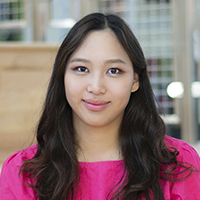How Identity Shaped My Writing
How Identity Shaped My Writing
I grew up in a small city in Michigan similar to where Ben, the main character of the Ben Lee series, moves to. As one of the very few Asian students in my school district, I faced my fair share of micro and macro-aggressions. From kids mocking my language to both peers and teachers assuming that I should naturally be good at math, I felt the weight of feeling different from everyone else. There were even times when I didn’t want to be Korean anymore. Like Ben, all I wanted was to be “normal.”
The moments that impacted me the most were when other kids made fun of my homemade Korean lunches. They called it “smelly” and “weird.” This, I later learned, was called “The Lunch Box Moment,” a shared experience among many immigrant and first generation children. I remember throwing away my lunches or eating them secretly in the bathroom to avoid comments or stares. There was no malicious intent from my peers, of course--they were just ignorant of Korean food and culture--but it still made me feel “othered.” That feeling of cultural alienation lingered for a long time after that. Even as an adult, I found myself being nervous if I brought a Korean lunch to work or a public gathering.
I wrote the first book in the BEN LEE series, The Magic Lunch Box, during the COVID-19 lockdown. Writing this book came almost naturally to me, because it was so parallel to my own experiences. Being stuck at home gave me the space for reflection, and I started thinking back to my experiences as a Korean-American. The shame I had of my culture. The desire I had to fit in. The eventual acceptance and pride I had for my identity. I began to process how big of a role, both negative and positive, my identity as a Korean-American played in my life.
I especially reflected on “The Lunch Box Moments” I experienced throughout my childhood. For many Asian Americans, our food is not only extremely delicious, but it is a form of comfort, a representation of one’s family and identity. I remember how my umma (mom) spent hours the night before or the morning of, preparing my lunch. I loved the crispy, flavorful dumplings she fried, the colorful assortment of ingredients in her kimbap, the steaming mix of rice, beef, and vegetables in her bibimbap. I could feel her love in each of the dishes, which only made the disgusted looks and comments from my peers sting more. I started to wonder how many kids were experiencing this as well.
In recent years, there have been strides to create more diversity in our media, to ensure that all types of identities are represented. While these are great steps, they don't mean that all issues of discrimination and ignorance are magically fixed. As a teacher, I still see students being made fun of for their culture or identity almost every day. Specifically with Korean culture, even with its recent popularity, there is still a noticeable lack of Korean American representation in children’s media. This was my motivation for writing the BEN LEE series. I knew there were still kids facing these challenges every day. I wanted to write stories that would serve as a stepping stone for children to accept others and accept themselves.
Outside of The Magic Lunch Box, the Ben Lee series also explores other parts of Korean culture. The second book in the series, The Magic Black Belt, focuses on taekwondo, a form of martial arts from Korea. I feel so fortunate to have the opportunity to write about my culture and share it with kids: some who will relate, and others who will learn.
When kids read a book like The Magic Lunch Box or The Magic Black Belt, I want them to feel empowered by their identities. When they feel empowered, they are filled with a deeper connection, appreciation, and understanding of their culture. I also want kids to read about others who are different from them. If they aren’t reading about other cultures and identities, then how can they learn about their experiences? Only with exposure can they truly begin to build empathy for others. I hope the Ben Lee series can serve as a mirror and window to so many young readers!
About Hanna Kim
Hanna Kim is the author of the Ben Lee series. She is also a middle school English language arts teacher. She was inspired to write this story because of her dad, who learned tae kwon do when he was younger. In her free time, Hanna loves to draw, read, make fun crafts, and eat Korean snacks. She lives in Michigan with her husband and cat, Zoro.
